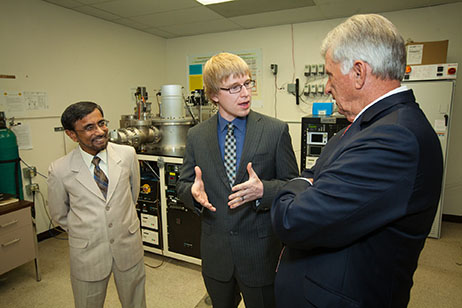U.S. Department of Energy Awards Picasolar $800,000 to Increase Efficiency of Solar Cells

Douglas Hutchings (center), CEO of Picasolar Inc., explains the start-up company's technology to Arkansas Gov. Mike Beebe after Picasolar's sister company received a SunShot Incubator Award. Hameed Naseem, a professor of electrical engineering, is on the left.
FAYETTEVILLE, Ark. – The U.S. Department of Energy has awarded a SunShot Tier 1 Incubator Award to Picasolar Inc., a start-up company affiliated with the University of Arkansas and founded by a graduate of the university.
The $800,000 award through the U.S. Department of Energy SunShot Initiative will be matched with $200,000 from Picasolar, bringing the one-year project to $1 million. The award is the result of the company’s patent-pending process to increase the efficiency of solar cells and could ultimately lead to new high-tech manufacturing jobs in Northwest Arkansas.
Douglas Hutchings, Picasolar’s chief executive officer, said the SunShot awards are the most prestigious and competitive grants a solar start-up company can receive.
“We are very pleased to receive the continuation of funding from the SunShot Incubator Program,” Hutchings said. “The goal of the U.S. Department of Energy SunShot Initiative is to get solar energy to 6 cents per kilowatt hour by 2020 and in doing so making solar one of the most cost-effective forms of electricity generation on the planet. It is exciting to think that a technology invented in Fayetteville by U of A graduates can play a big role in this process.”
Picasolar’s grant was one of 20 to small businesses nationwide totaling more than $14 million that were announced on Wednesday, Oct. 22, by Energy Department Secretary Ernest Moniz.
“As U.S. solar installation increases and the cost of solar electricity continues to decline, solar energy is becoming an increasingly affordable clean energy option for more American families and businesses,” Moniz said. “The projects announced today will help the U.S. solar energy industry continue to grow, ensuring America can capitalize on its vast renewable energy sources, cut carbon pollution, and continue to lead in the world in clean energy innovation.”
One year ago, Silicon Solar Solutions, Picasolar’s sister company, received $500,000 for a SunShot Tier 0 Incubator Award, which is targeted for early-stage assistance to help startup companies commercialize their inventions while encouraging private sector investment. The new award is intended to accelerate the transition of early stage functional prototypes to manufacturing and commercially relevant prototype made in the lab.
Both Picasolar and Silicon Solar Solutions are Genesis Technology Incubator clients at the Arkansas Research and Technology Park. Picasolar will continue to work with its research partners at the Georgia Institute of Technology and Roth & Rau, a German solar energy company, and has added China-based Yingli Solar, the world’s largest manufacturer of solar panels, as a partner on the new award.
 “The SunShot program is phenomenal,” Hutchings said. “In addition to the financial support, we get to work with world-class scientists at Department of Energy national labs for third-party validation and technical expertise. This award is a huge milestone for Picasolar.”
“The SunShot program is phenomenal,” Hutchings said. “In addition to the financial support, we get to work with world-class scientists at Department of Energy national labs for third-party validation and technical expertise. This award is a huge milestone for Picasolar.”
Hutchings founded Silicon Solar Solutions in 2008 while a graduate student at the University of Arkansas. In January 2013, the company submitted an application for a full patent on a self-aligned hydrogenated selective emitter for N-type solar cells. The emitter, invented by Seth Shumate, a doctoral candidate at the U of A and chief technology officer for Picasolar, could improve the efficiency of solar cells by 15 percent and could save an average-sized solar panel manufacturer $120 million annually, making the panels, and solar energy, more affordable for consumers, Hutchings said.
If successful, the emitter represents the single largest technology leap in solar power in 40 years, according to Hutchings.
Hutchings earned a doctorate in microelectronics-photonics at the University of Arkansas in 2010. Shumate is a doctoral candidate in the microelectronics-photonics program, offered by the College of Engineering and J. William Fulbright College of Arts and Sciences.
University of Arkansas
The University of Arkansas provides an internationally competitive education for undergraduate and graduate students in a wide spectrum of disciplines; contributes new knowledge, economic development, basic and applied research and creative activity; and provides service to academic and professional disciplines and to society in general, all aimed at fulfilling its public land-grant mission to serve Arkansas and beyond as a partner, resource and catalyst. The Carnegie Foundation classifies the University of Arkansas among only 2 percent of universities in America that have the highest level of research.
SunShot Initiative
The U.S. Department of Energy SunShot Initiative is a collaborative national effort that aggressively drives innovation to make solar energy fully cost-competitive with traditional energy sources before the end of the decade. Through SunShot, the Energy Department supports efforts by private companies, universities, and national laboratories to drive down the cost of solar electricity to $0.06 per kilowatt-hour.
Topics
Contacts
Douglas Hutchings, chief executive officer
Picasolar
501-339-1110,
doug@picasolar.com
Chris Branam, research communications writer/editor
University Relations
479-575-4737,
cwbranam@uark.edu
Headlines
New Study Examines Influence of Social Media on Televised Debate Viewing
A new paper by a multi-disciplinary team suggests that inclusion of social media visuals on screen undermines the underlying purpose of presidential primary debates.
Distinguished Lectures Committee to host Dylan Sprouse in final spring lecture
Dylan Sprouse, actor and writer, will deliver a moderated question and answer session as part of the Distinguished Lectures Committee's series at 7 p.m. Wednesday, April 24, at the Walton Arts Center.
Honorable Consul of Peru Liliana Trelles to Give Talk at U of A
Trelles, a specialist in international relations as well as security, national development and defense, will meet with U of A Latine students today and give a talk at 3 p.m. at Mullins Library 439.
Chancellor's Commission on Women Recognizes Extraordinary Women and Women's Advocates
This year's honorees will be recognized at the commission's Extraordinary UA Women and Women's Advocates recognition event at 11 a.m. Monday, April 22.
Faculty Oboist Theresa Delaplain to Perform Multimedia Concert
Delaplain, assistant professor of music, will perform a program and premiere "Of Children, Mind and Earth" at 8 tonight at The Medium's performance center in downtown Springdale.




